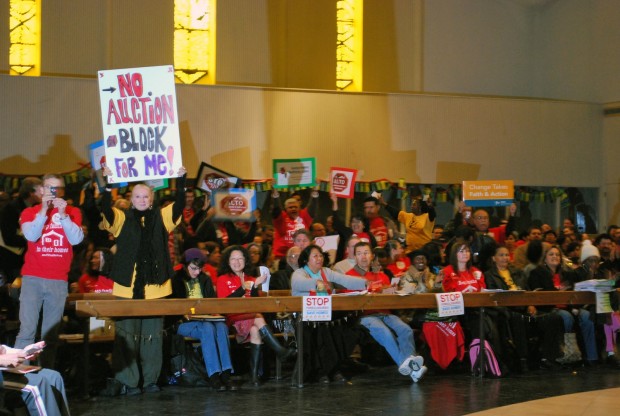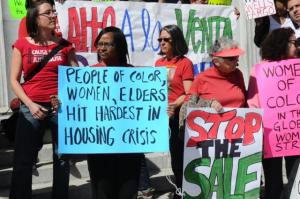Oakland Seeks Answers as Residents Continue to Be Displaced and Dispossesed
Oct 4, 2014

Photo courtesy of Oakland North.
By Ken Epstein
With all the talk of economic and housing market recovery, people may think that Oakland’s flatland residents are singing, “Happy Days Are Here Again.”
But the reality is quite different. Fueled by market forces as well as policies implemented by courts and financial institutions, the gentrification of Oakland – displacement and dispossession of homeowners and renters – continues at alarming rates.
City and nonprofit efforts lend support to individual families but so far have not reached a scale sufficient to make a difference in current trends.
The foreclosure tsunami, which blasted through Oakland from 2007-2011, took 10,500 Oakland homes. The families that were ejected were mostly Black, Latino, seniors on pensions or people with disabilities.
Though it is true that the rate of foreclosure is down and continuing to decline, a total of 3,435 notices of default have been issued to Oakland homeowners since January 2012, according to an Aug. 21 report on foreclosure issued by the City of Oakland.
In the latest quarter, between April and June, 161 homeowners received notices of default. During the same period, 71 homes were sold at auction.
Meanwhile, Oakland’s housing market prices continue to explode, “bolstered by an influx of international capital that makes our city one of the nation’s fastest-moving housing markets,” according to the report produced by the city’s Housing and Community Development Department.

“Homes in Oakland only stay on the market for an average of 14 days, with many homes attracting multiple offers and resulting in inflated sales prices,” said the report, citing a study by the California Association of Realtors.
Oakland’s median home sales price in June reached an “unprecedented” $489,150, a 28.6 percent increase over the price in 2012.

Related to the changes in property value, estimated rents for all houses in Oakland in June was $2,124, a 31 percent increase in the last 36 months.
“The high cost of housing may … be a contributing factor in Oakland’s existing income inequality by discouraging low- to moderate-income households from moving into (the city) or pushing existing households out of Oakland,” the report said, citing a Brookings Institution study that ranked Oakland as the 7th highest city in the nation for income inequality.
The brunt of these trends is being experienced by the city’s African American families. The number of Black residents dropped by 24 percent or 33,502, residents between 2000 and 2010, according to the report.
In addition, the report said, the median income for African American, Latino and Asian households has fallen since 2000, and the number of children in the city has decreased in that period by 16.7 percent.
Between 1980 and 2010, seven census tracts in the East Oakland flatlands had more that a 25 percent drop in home ownership.
As a side effect of the housing crisis, many families are “living in deplorable conditions,” the report found. “Oakland homes in 2011 had more problems with signs of rats, heating equipment failure and a lack of kitchen facilities, compared to the national average,” the report said.
This crisis also means that Oakland’s homes are not ready for a natural disaster. “In the next major earthquake, over 14,000 housing units in low- to moderate-income flatland neighborhoods are at risk for collapse or other damage,” the report said.
Meanwhile, the city continues to build affordable housing units and fund a foreclosure prevention and mitigation program.
Approved by the City Council in 2012, the foreclosure prevention program in its first year kept over 90 homeowner households and over 50 tenant households in their homes. This year, the program has helped 18 successfully obtain loan modifications.
In addition, nonprofits are helping out. The Unity Council in the Fruitvale District this year created a fund that helped three families keep their homes.
Catholic Charities recently has begun offering $5,000 grants to households threatened with being pushed out of rental housing, helping 18 households with eviction prevention and utility shut-off prevention.
Acknowledging a housing crisis that impacts urban areas through the country, the City Council is seeking solutions that can address the magnitude of the problem that the city’s residents face.
“The City of Oakland has been attempting to develop bigger scale prevention solutions beyond the labor-intensive individual-by-individual homeownership preservation strategies,” the report said.
City staff is working on proposals, which are scheduled to be discussed by the council in December.